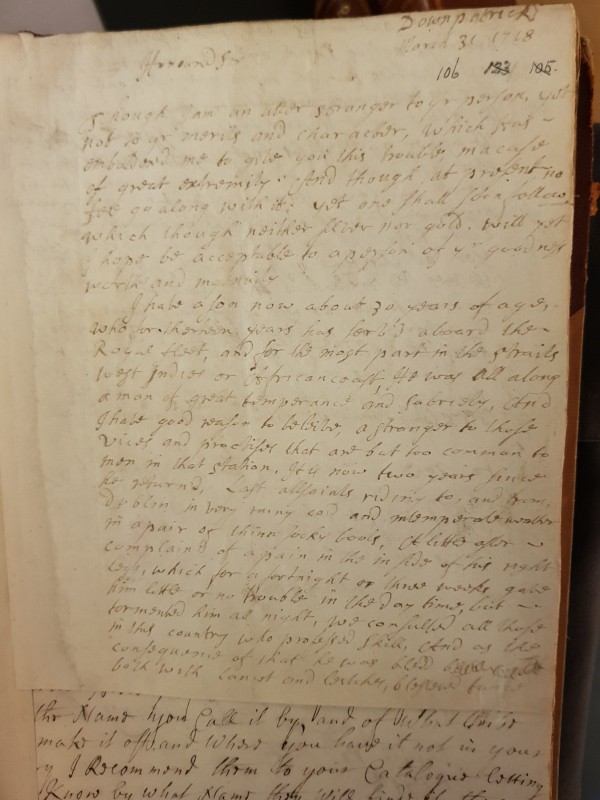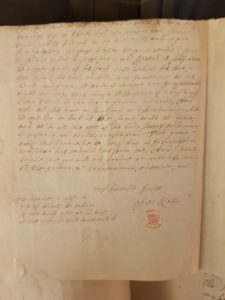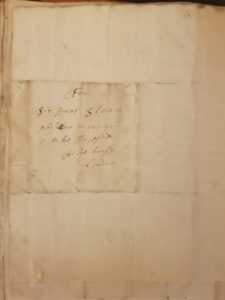By Alice Marples
We all miss our friends – whether they leave for study, work or holidays, their sudden absence in our daily lives can leave a bit of a gap. Most of us are fortunate enough to expect to see them again, sooner or later. Early modern absences were different, especially if they involved a lengthy journey to the New World. With countries at war, and the dangers of both high-seas and unknown lands, letters could take a very long time to go halfway around the seventeenth-century world. There were any number of possible reasons for miscarriage, some more deadly than others. Letters exchanged across these absences can therefore reveal the ways in which routine gossip and friendly banter were used to mask loss and genuine fear.

Neither the correct country or period – but you get the idea! [By Francisco Aurélio de Figueiredo e Melo (1854–1916) via Wikimedia Commons]
Though the highly-esteemed naturalist, John Ray, was a close and loving friend of Sloane’s for many years, he was almost entirely taken up with his own botanical cataloguing work at the point of Sloane’s imminent departure, and seems to think only in those terms: “If you goe to Jamayca I pray you a safe and prosperous voyage. We expect great things from you, no less than the resolving all our doubts about the names we meet with of Plants in that part of America.” Because he did not regularly see Sloane–however frequently they corresponded or visited one another–Sloane’s absence was, for him, no more an insurmountable issue than usual.
Sloane’s physician colleague, Tancred Robinson, on the other hand, missed him deeply. His first letter, in Robinson’s typical off-hand style, covers anxiety with medical banter, betraying his sincere affection and strong sense of Sloane’s physical distance:
My deare Dr This hopes to find you Safe at St Iago notwithstanding the great reports at London of the Drs dying at Sea, and of his being taken by Pyrates; I sacrificed daily to neptune for your preservation, your friends at Dicks and Bettys were mourning for you, but I conforted them with Cordiall and Alexipharmick draughts, they are all well and are like to continue so if they hear often from you, for without your frequent prescription wee can neither have health or so much as life. (Sloane MS 4036, f. 30)
Sloane, too, seems to have preferred to use his correspondence with his closest friends as a way of maintaining the same relationship they had while in close proximity. For example, much of his correspondence with William Courten contained advice for the elderly man on his health, acknowledging that his concern had grown now that he was no longer close at hand to watch over him. Sloane sought to ease the separation by reminding his old friend that he could anticipate his words and, therefore, not miss him at all:
you know my opinion about severall of your distempers & I am almost confident I am in the right, I hope for my sake you will abstaine as much from excesse in wine as the too good & complaisant humour will suffer you, you cannot doe me a greater favour then to be careful of your own health… I have att all times discoursd soe largely my opinion of the state of your body that I believe you may remember every thing very particularly. (Sloane MS 3962, f. 309)
In a later letter, Sloane longs to be reunited (though not at the expense of Courten’s health, however imaginary!): “you may be sure the last I have already is delightfull to me for this is indeed a new world in all things, I wishd heartily for you to day if you could have been back in your chambers at night, I find this place very warme.” (Sloane MS 3962, f. 310)
By writing in a way that maintained the natural, nuanced tones of the friendships left behind, correspondents remained bound together across vast distances. At home, reading letters aloud could conjure up the image of a person in the space they used to occupy. Robinson, for example, deliberately seeks to provoke an anticipated reaction from Sloane:
Wee are all overjoyed to understand by yours… that you weatherd your voyage so couragiously, and was in such good health under a fiery Sun, and new climate. I read your letter to all your friends at Dicks, Bettys, Trumpet, etc. who return you their best services, and hearty wishes for your welfare. Mr Courtin shewd mee your letters, and we often sacrifice a bottle to you. (Sloane MS 4036, f. 33)
Robinson is here either comforting the famously temperate Sloane with the assurance he and Courten are dutifully following his medical advice… Or teasing him over their defiance in his honour! If the latter, it is highly likely that Sloane would have been equal parts entertained, touched and infuriated by his friends in this instance. You can imagine him rolling his eyes as he closed the letter.





